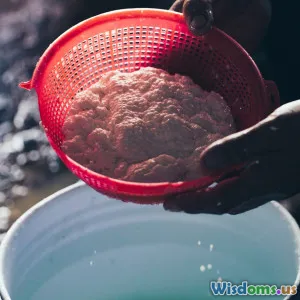
Plant Based Protein vs Whey Protein Which Is Better for Athletes
10 min read Explore the ultimate showdown between plant-based and whey proteins to find which is best for athletes’ performance and recovery. (0 Reviews)
Plant-Based Protein vs Whey Protein: Which Is Better for Athletes?
Athletes constantly seek optimal nutrition to enhance performance, recovery, and muscle growth. Protein supplements have become a staple in many sports diets, with two heavyweights dominating the market: plant-based protein and whey protein. But which one truly holds the crown for athletes? This article delves deep into the science, benefits, drawbacks, and real-world applications of both proteins to help you make an informed choice.
Introduction
Protein is indispensable for athletes. It aids muscle repair, promotes growth, and supports overall recovery post-exercise. Whey protein, derived from milk, has long been revered for its rapid absorption and rich amino acid profile. Meanwhile, plant-based proteins, sourced from peas, rice, hemp, and others, are riding a wave of popularity due to sustainability and dietary preferences. Despite their differences, each offers unique advantages that cater to different athlete needs.
Let’s dissect these proteins methodically.
Understanding the Basics
What is Whey Protein?
Whey protein is a byproduct of cheese production. It contains all nine essential amino acids, making it a complete protein. Rapidly absorbed, it's favored for post-workout consumption because it swiftly delivers amino acids to muscles, kickstarting repair processes.
Example: According to a 2018 study published in the Journal of the International Society of Sports Nutrition, whey protein consumption post-resistance training increased muscle protein synthesis rates significantly within 30-60 minutes.
What is Plant-Based Protein?
Plant-based proteins are extracted from various plant sources. Unlike whey, a single plant protein may lack one or more essential amino acids, but many supplements combine sources (e.g., pea and rice protein) to form a complete profile.
These proteins are slower-digesting than whey, leading to a steadier release of amino acids.
Real-World Insight: Vegan bodybuilder Nimai Delgado credits a blend of pea, rice, and pumpkin seed proteins for supporting his muscle mass without dairy or animal products.
Nutritional Profile and Amino Acid Content
Amino Acid Completeness
Whey protein’s claim to fame is its high leucine content, vital for triggering muscle protein synthesis. Leucine concentration in whey can be as high as 14% of total amino acids.
Plant proteins often have deficient amounts of one or two essential amino acids—for example, rice is low in lysine, while pea protein contains less methionine. However, combining sources addresses this.
Protein Quality Measures
- Biological Value (BV): Whey scored around 104, indicating excellent utilization.
- PDCAAS (Protein Digestibility-Corrected Amino Acid Score): Whey routinely hits near 1.0, the highest score.
- Plant Proteins: When combined appropriately, pea and rice blends score around 0.9, just under whey yet highly effective.
Digestibility and Absorption
Whey: Fast-Acting
The rapid absorption rate (reported to be about 10 grams per hour) makes whey ideal immediately post-exercise when muscles need amino acids swiftly.
Plant-Based: Sustained Release
Plant-based proteins digest slower due to fiber and antinutrients, aiding a steadier anabolic response but possibly making them less ideal for immediate post-exercise windows.
Data snippet: A 2020 research in Nutrients showed pea protein’s absorption rate approximately 20-30% slower than whey in healthy young adults.
Digestive Tolerance and Allergies
Whey protein can cause digestive discomfort in lactose-intolerant individuals, resulting in bloating or gas, although isolates are low in lactose.
Plant proteins typically are hypoallergenic, lower in potential irritants, and also contain additional beneficial compounds like fiber and antioxidants.
Environmental and Ethical Considerations
Plant-based proteins are celebrated for their lower environmental footprint. Producing a kilogram of plant protein requires considerably less water, land, and generates fewer greenhouse gases versus dairy-based whey.
Athletes increasingly consider sustainability:
- A 2021 survey by Runner’s World found 38% of athletes factoring environmental impact into their supplement choices.
Performance and Recovery: What Does Science Say?
Muscle Growth and Strength
Multiple studies confirm that both whey and high-quality plant-based protein blends can enhance muscle mass and strength gains equivalently when consumed in appropriate doses.
Example: A 2019 randomized controlled trial found no significant difference in fat-free mass and strength gains between groups consuming whey or pea-rice protein over 8 weeks.
Satiety and Weight Management
Plant proteins' slower digestion aids longer satiety, which benefits athletes aiming for lean mass or weight control.
Antioxidant Supply
Plant-based proteins often come with phytochemicals which help reduce exercise-induced oxidative stress, potentially aiding recovery in strenuous training phases.
Practical Considerations for Athletes
Taste and Mixability
Whey generally mixes smoothly and has an inherently creamy texture.
Plant proteins sometimes have earthy or grainy tastes, which manufacturers mitigate via flavoring and formulation.
Cost and Availability
Whey remains widely available and cost-effective.
High-quality plant blends tend to be pricier but are catching up in affordability.
Who Should Choose What?
| Athlete Profile | Recommended Protein Choice | Reason |
|---|---|---|
| Lactose-intolerant | Plant-based protein | Avoids digestive issues |
| Vegan or Ethical Choice | Plant-based protein | Alignment with values |
| Need Rapid Recovery | Whey protein | Fast absorption post-workout |
| Weight Management | Plant-based protein | Sustained satiety and fiber |
| Budget-conscious | Whey protein | Generally more affordable |
Conclusion
There is no universally “better” protein for athletes—it depends on individual goals, dietary boundaries, and personal values. Whey protein boasts unmatched amino acid profiles and rapid digestion, making it exemplary for immediate muscle repair and growth. Conversely, plant-based proteins offer a sustainable, allergen-friendly, and increasingly effective alternative that supports long-term health and recovery.
With advances in formulation, plant-based protein blends now rival whey in anabolic potential, making it a viable choice for diverse athlete populations.
Ultimately, the best protein is one that fits your physiology, ethics, and lifestyle—that you consistently consume to fuel your performance and recovery.
References
- Journal of the International Society of Sports Nutrition (2018) - Whey protein’s impact on muscle protein synthesis
- Nutrients (2020) - Absorption rates of plant versus dairy proteins
- Runner’s World (2021) - Athlete survey on supplement sustainability
- Nutrients (2019) - Comparative study of whey and plant protein effects on muscle strength
Rate the Post
User Reviews
Popular Posts




















